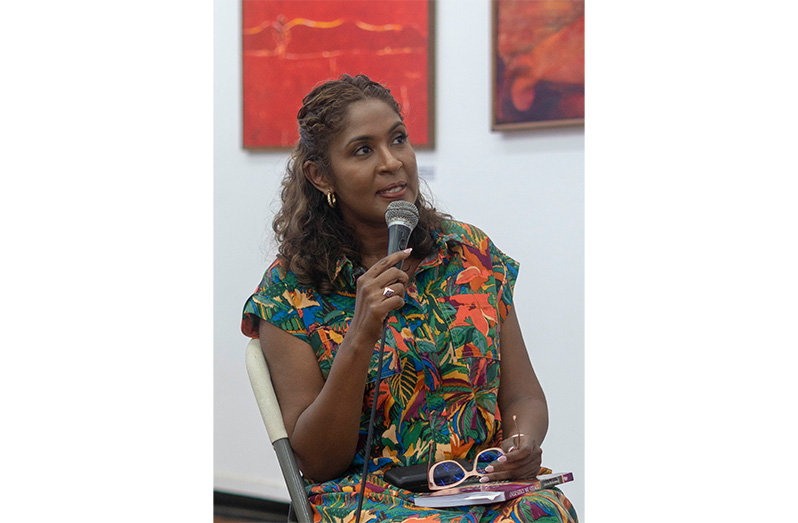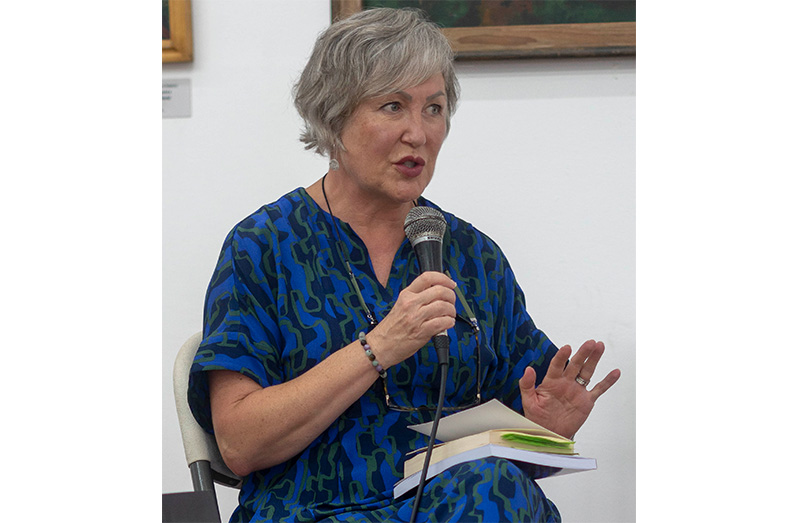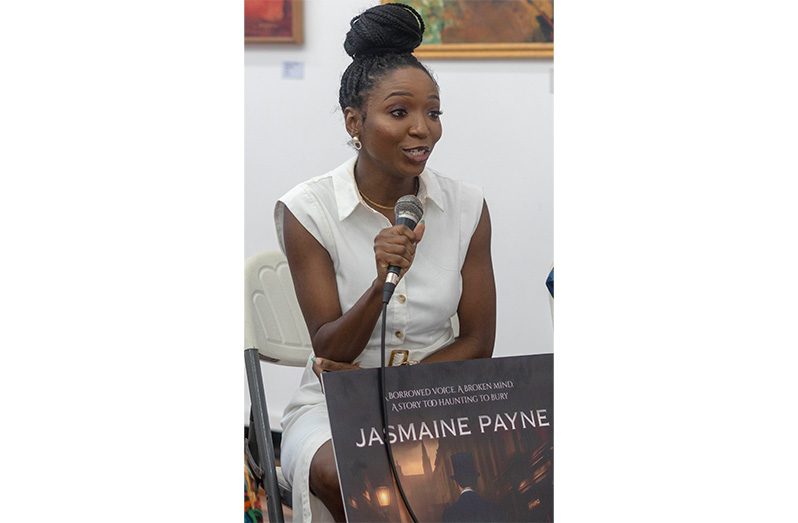Caribbean Stories and Storytellers Take Centre Stage this year at Guyana’s Literary Festival
THE storytellers, poets, and writers of the Caribbean are as unique as their works and the stories they tell. The Caribbean region has given rise to some of the world’s best works and writers, and, in Guyana, writing is an ever-evolving art form. Last week saw Guyana host the Guyana Literary Festival, much more than an event for the appreciation of writers. This year’s festival welcomed some of Guyana’s and the Caribbean’s most notable literary voices. From books that bend time and reality, like Jasmaine Payne’s Leech, to Celeste Mohammed’s Ever Since We Small, a story of a turbulent family told from the perspective of the trees, and Alison Donnell’s Lost and Found, which revisits the Caribbean’s best but forgotten writers, this year’s festival was a celebration of Caribbean excellence, pride, and identity.
Telling a Unique Story: Jasmaine Payne’s Debut Novel Leech
Leech is a book that will have you intrigued; but far too immersed to put it down. Written by Guyanese author, editor, and communication specialist Jasmaine Payne, Leech breaks new ground for both Payne and Guyana’s literary landscape as it marks the first psychological thriller written by a female author based in Guyana. Payne, whose career in writing began at just eleven years old and includes more than 15 years of journalism experience and over eight years as a professional editor, described Leech as an immersive adventure that takes the reader through various timelines, beginning in 1800s Britain and making its way to modern-day New York.
The book revolves around the ideas and passions of its titular character, John Thomas Reginald Leech, who, in a search for greatness he could not achieve during his life, seeks immortality more than 100 years later through struggling writer Arianne Smith; a character inspired by the author. The characters tell a story filled with the themes of passion, obsession, and the dark corners of the human psyche.
Talking about the writing process behind Leech at the Guyana Literary Festival, where the cover for Leech was unveiled, Payne shared, “What started as just 11 years ago, myself wanting to write a full-length novel, it became, over that 11 years, a journey of just self-realisation, just seeing my strength as a writer, and then falling in love with storytelling, because the book itself ended up becoming a book about storytelling.”
The uniqueness of Leech lies in more than just its storyline. Originally inspired by Jack the Ripper, Leech was meticulously written with depth, tackling very complex themes told through the book’s various characters across different timelines. As Payne explains, “Within the book itself, there are three stories being told across three timelines, and I was a bit confused myself by the end of it, but it also looks at our human obsession with recognition. As you know, in the modern age, we all want to be the next famous TikToker, and so I experimented what that looks like in modern days, as human beings, but then I also go back to the 1800s to look at what that may have looked like when we didn’t have all of this. What I try to suggest is that this obsession with recognition is more a human condition than anything else. It’s not necessarily just social media. It’s also about emotional parasites. It’s about women finding their voice,” she added.
Leech will hit the shelves of Guyanese bookstores on September 20th.
Telling the Stories of the Caribbean: Celeste Mohammed’s ‘Ever Since We Small’.
Trinidadian lawyer-turned-prolific writer Celeste Mohammed is one of the voices behind Caribbean stories on the international stage. She holds an MFA in Creative Writing from Lesley University, Cambridge, Massachusetts. Mohammed is the author of the novel-in-stories Pleasantview, which won the 2022 OCM Bocas Prize for Caribbean Literature, the 2022 CLMP Firecracker Award for Fiction, and was a finalist for the UK Society of Authors McKitterick Prize for Fiction. Her short fiction has been recognised with numerous awards, including the PEN/Robert J. Dau Short Story Prize, the Virginia Woolf Award for Short Fiction, and the John D. Gardner Memorial Prize. In 2024, she was shortlisted for the Commonwealth Short Story Prize.

Her most recent book, however, titled Ever Since We Small, tells the story of an Indian family living in a predominantly non-Indian community that is undergoing change. Published by Jack Miranda Books UK, Ever Since We Small is a family saga that takes its readers from the days of the British Raj in India to multicultural modern Trinidad. The book, like Mohammed herself, is unapologetically Caribbean—ushering in cultural elements and language. Written in a blend of Standard English and several flavours of Trinidadian Creole, the book follows the bloodline of a young woman, Jayanti, after her decision to become a girmitiya, an indentured labourer in the Caribbean.
Highlighting that the book is very personal to her, Mohammed shared, “You don’t often see Indo-Caribbean dialect or Creole written. This book attempts to do that, to put that down in writing so people can experience it. Because it’s a dying language. The people who actually speak like that are less and less and less. So there are many ways in which this book is special for me.”
Ever Since We Small also aims to highlight some of the major social issues present in Trinidadian and Caribbean culture, with violence against women being at the forefront. Although a difficult topic to tackle, Mohammed shares that, to her, Ever Since We Small is her way of not just highlighting but telling the real, raw stories of violence against women that need to be told. “In Trinidad we have a long history of intimate partner violence. And I think it was around 2001 we had this outpouring of people into the streets protesting against what was happening. And I looked at all the protests and people holding vigils and lighting candles. And in my own way I said, you know what, my vigil, my candle, will be written in print. Because a candle is a thing you light, now it’s out. But if I write this book exploring this history, then it’s forever there. It’s a candle that will not go out,” she shared.
Remembering Great Storytellers: Alison Donnell’s Lost and Found
British literary scholar and professor Alison Donnell is known for her pioneering work in Caribbean, postcolonial, and Black British literature. Currently a professor of English at the University of East Anglia, Donnell has spent over two decades researching the literary voices of marginalised and vulnerable groups, with a focus on gender, sexuality, and diaspora. Donnell co-edited The Routledge Reader in Caribbean Literature and has published extensively on writers such as Una Marson and Olive Senior. Her most recent book, however, Lost and Found: An A-Z of Neglected Writers of the Anglophone Caribbean, is a fascinating compilation of some of the Caribbean’s best but forgotten writers.

Speaking to the Pepperpot Magazine at the recently concluded literary festival, Donnell shared that there are numerous Guyanese writers and authors who, although prolific in their craft, may have had their work lost or forgotten. But Lost and Found aims to reintroduce these forgotten storytellers, whose work Donnell says is just as relevant and captivating today as it was decades ago. “There are very many writers of significance in Guyana who people might not be aware of. And that there’s a very long literary tradition. And it’s important to know that, to have a sense of those literary ancestors as well, I think. And maybe, you know, a lot of those writers wrote for children, so it would be nice if their works could find their way back into schools. That would be very special.”
Lost and Found not only seeks to remind the Caribbean about the works of these writers, but also their lives and the way that shaped their work. One of the important points that Donnell’s book seeks to highlight is the fact that, for many Caribbean writers, their stories focused on their origins; with Guyanese being no exception. As Donnell shared, “All of these writers, firmly their writing is very Guyanese. So, you know, writers who were addressing the landscape, the cultural multiplicity, the languages, everything about this society. They wrote so that people could read this society and this place.” She further added, “And so it would be lovely if they could be read again here.”
The 2024 Guyana Literary Festival was more than just a gathering of writers, it was a revival, a platform, and a promise. A reminder that the Caribbean continues to produce stories worth telling, voices worth hearing, and histories worth remembering.



.jpg)










